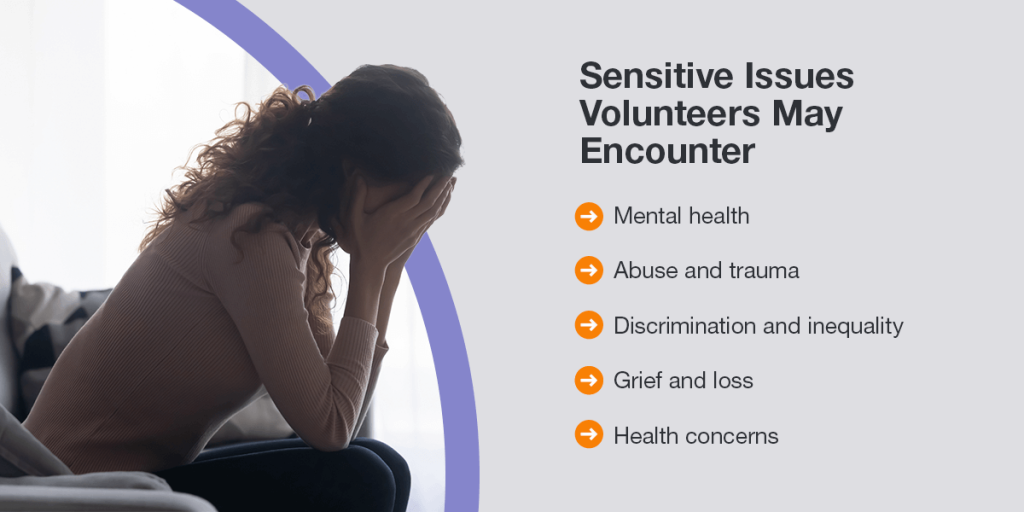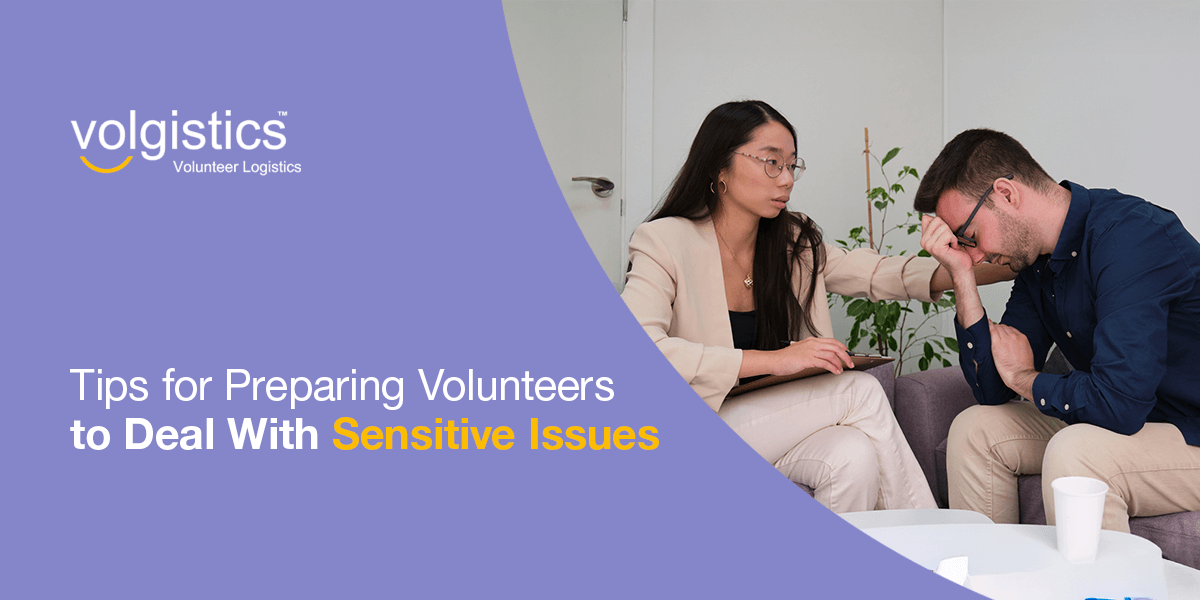Volunteers often encounter challenging situations. Depending on the industry, they may deal with individuals facing mental health crises, experiencing trauma, or navigating complex social issues. These situations can have an impact on both the volunteers and the individuals they serve.
As a volunteer organizer, providing resources for sensitive issues can help volunteers feel confident and equipped to respond appropriately. Additionally, preparing volunteers adequately may lower the burnout or stress levels in your volunteer program.
With these tips for preparing volunteers to deal with sensitive issues, you can create a supportive environment where volunteers feel empowered and capable with the necessary skills and knowledge.
Sensitive Issues Volunteers May Encounter
Sensitive issues refer to topics or situations that may evoke strong emotions, discomfort, or distress among individuals. These issues involve personal, social, or cultural factors that require careful handling and consideration.
These topics are examples of sensitive issues:
- Mental health: Topics related to mental illness, emotional distress, or psychological well-being.
- Abuse and trauma: Situations involving physical, emotional, or sexual abuse, as well as the effects of trauma on individuals.
- Discrimination and inequality: Issues related to race, gender, sexual orientation, disability, or socioeconomic status that highlight systemic injustices.
- Grief and loss: Experiences related to the death of a loved one or significant life changes that can lead to mourning.
- Health concerns: Topics surrounding serious illnesses, disabilities, or end-of-life issues that may be challenging to discuss.
Individuals facing sensitive issues may experience anxiety, depression, or feelings of isolation. People may also feel judged or misunderstood, which can prevent them from seeking help or support. Addressing sensitive issues can lead to increased advocacy and awareness within communities and may even contribute to improved overall health outcomes. That’s why it’s important for volunteers to understand these issues and approach them with empathy and care.

Preparing and Training Volunteers for Challenging Situations
Preparing volunteers for challenging situations will allow them to provide appropriate support to individuals, build trust and credibility within the community, and respond effectively in crisis situations. Here’s how you can prepare your volunteers.
1. Conduct Volunteer Training for Sensitive Issues
To ensure that volunteers are well-prepared to handle sensitive issues with empathy and confidence, your organization should design and implement a comprehensive training program. Establish specific, measurable goals for what they should learn.
Begin with an orientation that introduces volunteers to the organization’s mission, values, and impact. Provide detailed instructions on the specific tasks they’ll perform, including expectations and responsibilities. Create a space where volunteers feel comfortable asking questions and discussing their concerns.
It’s a good idea to get creative and use a variety of training methods:
- Hands-on training: Incorporate practical exercises and role-playing scenarios to simulate real-life situations. This method allows volunteers to practice their responses in a safe environment.
- Interactive workshops: Foster an engaging atmosphere through group discussion, peer interactions, and collaborative problem-solving.
- Multimedia resources: Use videos, images, and animations to explain complex concepts and keep volunteers engaged.
- Training materials: Offer handbooks and written materials that volunteers can refer to as needed. Include information about potential risks and safety measures to prepare them for sensitive situations.
Throughout the training process, recognize and celebrate the contributions of volunteers to foster a sense of belonging and appreciation.
2. Prepare Volunteers With Communication Skills
Preparing volunteers for difficult conversations, especially around sensitive issues, is essential for fostering trust and understanding. Here are a few approaches to help them develop these communication skills:
- Active listening techniques: Teach volunteers to concentrate on the speaker, understand their message, and respond thoughtfully. Encourage them to ask clarifying questions before responding. This way, volunteers show respect for the speaker’s perspective.
- Non-verbal communication: Train volunteers to be mindful of their body language, facial expressions, and tone of voice. Volunteers should use open and inviting body language to create a safe space for individuals to share their feelings and experiences.
- Cultural competence: Volunteers should be aware of and sensitive to cultural differences that may affect interactions. Encourage them to approach each conversation with curiosity and openness rather than making assumptions about individuals based on their cultural background.
- Respectful language: Remind volunteers to assume positive intent, remain curious, and commit to learning rather than debating. Volunteers should focus on the issues at hand rather than personalizing discussions. They should also avoid blame, speculation, and inflammatory language.
3. Emphasize the Importance of Self-Care
Self-care is crucial, as dealing with sensitive topics can be emotionally taxing. Volunteers should learn to manage their stress and seek support when needed. Organizations can emphasize the importance of self-care by implementing a variety of strategies, including:
- Self-care education: Include training on self-care strategies and emotional stress management during the onboarding process. Provide information about the potential risks and safety measures, ensuring volunteers understand how to protect their mental health while performing their duties.
- Regular communication: Use a volunteer management platform to facilitate regular communication from volunteer managers to volunteers in the form of updates, feedback, and support.
- Debriefing sessions: Organize regular debriefing sessions where volunteers can discuss their experiences and feelings after dealing with sensitive issues.
- Flexible scheduling: Use a volunteer management platform to allow volunteers to choose shifts that fit their personal commitments. They can also sign up for vacant schedule openings or remove themselves from days they can no longer serve as scheduled. This flexibility can alleviate stress and promote a better work-life balance.
- Recognition and appreciation: Regularly recognize and celebrate volunteers’ contributions and milestones. This effort will boost morale and reinforce your team’s sense of value within the organization.
4. Encourage a Safe Environment for Respectful Interactions
To create a safe environment for volunteers to have respectful interactions with the people they work with, develop a clear code of conduct that outlines expected behaviors and interactions. It should include guidelines on respect, empathy, and professionalism.
Additionally, establish and communicate clear confidentiality policies that protect the privacy of individuals served by the organization. Volunteers should understand the importance of safeguarding sensitive information.
Respectful interactions don’t stop between volunteers and the people they serve. It’s essential to foster an environment where volunteers also feel safe to share their experiences and concerns. Trust is built when volunteers know that their confidentiality will be respected and that they can speak openly without fear of judgment.
Track Volunteer Training and Services With Volgistics
Preparing volunteers for sensitive issues can make a positive impact in the community. Using a volunteer management platform, you can store training materials and resources related to sensitive issues. This kind of platform will also allow you to track which volunteers have completed training, ensuring all team members are adequately prepared.
At Volgistics, we set the standards in volunteer management. With the Volgistics software, you can manage volunteer schedules, open assignments that may involve sensitive issues, and send communications to volunteers.
Improve your volunteer management with software that works for you. Start your 30-day free trial and see how Volgistics can help you prepare volunteers.


